6 Creative Ways to Use Machine Learning for Small Business
Like this project
Posted May 13, 2023
Wondering how you can use AI to propel your business forward in 2023? Check out this guide to learn creative use cases in machine learning for small business.

Small business owners face one problem: Lack of resources. In today’s competitive market, it’s hard to compete with the Amazons and Ebays of the market, which have massive budgets for business optimization.
But now, that's not a problem anymore. You can use or develop machine learning (ML) tools to bring down your costs and grow your business.
For example, previously, working with celebrities like Queen Latifah for a marketing campaign would cost millions of dollars. But now, all you have to do is use Lenovo’s Evolve to generate a custom video ad with her face on it.
How? Machine learning.
If you're a small business owner wondering how machine learning works and how you can leverage it, keep reading. This guide will explore what this technology can mean for you and your business—and how you can leverage it.
What is machine learning and how can it help small businesses?
With applications like ChatGPT and DALL-E taking the world by storm, there's still a lot of confusion about what powers them. This is true, especially in the small business community with minimal exposure to such technologies.
Machine learning (ML) is a method of artificial intelligence (AI) that allows computers to learn from large datasets and give an output based on that data. These models are not trained to make decisions—but rather provide an output based on what it's been trained on.
For example, if you train an ML model based on your e-commerce store's purchasing data, the model will eventually be able to tell you what your customers want. As a result, you can make informed decisions on what products to stock, how to provide personalized recommendations and more.
The idea is that instead of spending hours manually analyzing huge chunks of data to come to one conclusion, you train a machine to do this for you. It saves you time, money, and effort in the long run—making your business efficient.
Small businesses have many challenges when it comes to operating in a competitive market:
Too many repetitive administrative tasks
Inability to build brand awareness at a faster pace
Lack of a large workforce to get the job done quickly
Lack of resources to scale the business in a short period
Lack of funds to spend on marketing and advertising campaigns
Burnout from spending time on tasks that do not make a difference to your revenue
When you look at these challenges, it boils down to two things: lack of resources and time. This is precisely the problem that ML solves.
James Wilkinson, founder & CEO of Balance One Supplements, a health startup, also felt this pull in his business. His team spent too much time and money on resource-intensive tasks, so he looked to ML to improve this.
“We wanted to maximize efficiency, especially when it came to data entry, cleaning, and analysis. We knew that by adopting machine learning to optimize these operations, we could make data-driven decisions more efficiently and at scale across our entire enterprise,” says Wilkinson.
It levels the playing field for small business owners and helps them scale faster—while impacting your bottom line positively.
Find a machine learning specialist for hire
What are the benefits of machine learning for small businesses?
There are several benefits of incorporating ML tools as part of your business. Here are a few of them:
Lower your operational costs with the right tools
ML tools make it easier for small businesses to reduce operational costs by removing the need for excessive and redundant resources.
If you're hiring five employees for round-the-clock customer service, you can reduce their hours and use chatbots instead. These bots can resolve basic queries and only escalate the issue when required. You will not have to pay agents for overtime and can reduce their workload.
It also helps you identify areas in your business that are inefficient and costing you too much money. For instance, excessive manual labor, redundant data processing, and time-consuming tasks do not contribute to the bottom line. You can automate these aspects and reduce your operational costs.
Expand the service capabilities of your business
Small businesses always have a hard time competing with larger companies as they're unable to offer a large set of services due to limited resources. But with ML tools, they can add more services and expand their offer—adding more value for their customers.
That’s how the Ling App, a language learning app, has identified which languages to focus on in their business. According to Simon Bacher, co-founder & CEO of Ling App, tools like Shogun have been of great help in this regard. This capability helped them expand their pool of languages based on actionable real-time data.
Enhance your customer service capabilities
You can also leverage ML tools to maximize your unstructured data. It refers to data from sources like social media posts, user reviews, feedback via email, support tickets, and email tickets. It does not have a consistent format—and is much harder to analyze.
But with machine learning, you can collect, analyze and act on customer data like large enterprises. For instance, use conversation intelligence tools to analyze your support tickets and sales calls. Use the output to train your support and sales agents and improve customer service.
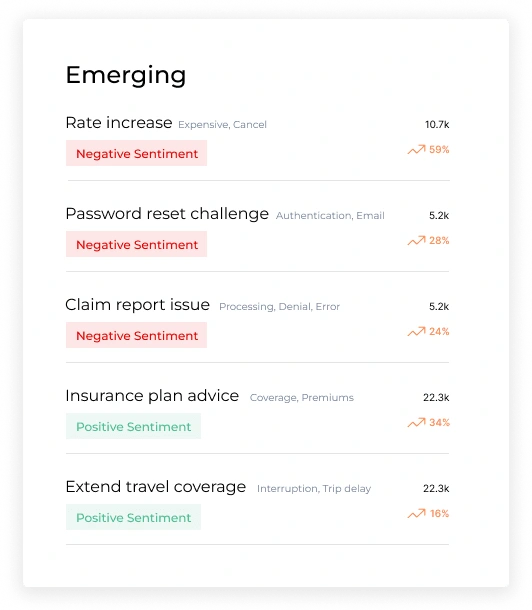
An example of how conversation intelligence tools can analyze customer data and identify topics of frustration in real-time | Source: Dashbot
Use predictive analytics to make data-driven decisions
You can use predictive analytics to take small chunks of your data, analyze them, and decide how to move forward. The idea is to create a model to help you make faster decisions based on real-time data streams—not historical data.
Companies like The Candida Diet have already benefited from this approach. After implementing an ML-powered recommendation engine in their e-commerce platform, they observed a 45% increase in conversion rates and a 15% growth in average order value.
Lisa Richards, CEO & creator of the company, says, "By analyzing customer behavior, preferences, and purchase history, the recommendation engine suggests products most likely to interest each customer. This has increased customer engagement and loyalty, as they feel their needs and preferences are being met."
Improve your organizational productivity
As a small business owner, you already spend too much time doing things a machine can do. So, why not leverage those tools? Considering that the barrier to entry is low with all the ML tools available right now, the efficiency and cost gains are worth it.
When Gust struggled to remove the high volume of spam accounts on their website, they knew they had to deploy advanced tools. They used Nyckel, an ML platform that detects spam profiles. All they had to do was use their internal data to train it and make an API call (a connection between two apps). Instead of wasting hours each week, they only spend 20 minutes filtering and removing these accounts.
On the other hand, companies like QMR leveraged their internal team of ML engineers and data scientists to develop an ML script that reduced their project time estimates by 60%.
Ultimately, it improves your workflow and significantly affects per-hour productivity.
How can you implement machine learning in your small business?
Here are a few simple steps to get started with ML as a small business owner:
Step 1: Determine what business problems you need to solve
As a small business owner, you're already running low on resources. While you may have 15 tasks that need to be automated—it's simply not feasible. Focus on the most pressing challenges at the moment and account for factors like:
Cost of development
Development time
Resources required
Data required (internal/external)
Short & long-term gains (ROI)
Run through your current operations with a fine tooth comb and identify which process could benefit from integrating an ML model. Once you have a list of processes, consult a machine learning expert.
Step 2: Consult a machine learning expert to create a well-defined strategy
Unless you have the in-house capabilities to create a tool, we recommend hiring an expert to get the job done. These experts will help align the internal team’s objectives with the best-suited technology. Plus, they’ll create a development strategy from scratch while keeping your goals and current resources in mind.
Pro tip: You can hire a machine learning expert from Fiverr’s database of freelancers who specialize in this process. You can narrow down the ideal person using our filters like:
Service options
Seller details
Budget
Delivery time
Pro Verified
Find a machine learning specialist for hire
They'll understand what your needs are, evaluate the ROI of the project and give you an estimate of which project will bring you the most value. It's crucial as it ensures you do not waste time and effort.
Ryan Nash, Chief Operating Officer at Gust, says, “Don’t do ML for the sake of doing ML. Follow Google’s advice and use heuristics as a first step before you implement ML. This will let you focus on the product and user experience, which are the most important parts of your business.”
It's also essential to ensure that there's expertise from both ends—your own business—and the technical expert. It ensures that the final product is in line with your needs and that the project always remains on track.
Step 3: Understand its capabilities and have the right expectations
Machine learning can help you solve some problems—but not all. You need to understand what it can and cannot do. A tool is meant to push your business forward—not the other way around.
There are several roadblocks you can expect in the process. Here’s what a few small business owners have to say:
"Aside from the technical challenge of building and implementing a new system, one of the largest problems we've faced is building trust with our team and users. For our team, this looks like completing extensive testing and building a large enough dataset to support the system's accuracy. For our customers, this looks like establishing transparency and educating users about the technology so they can begin to trust it." — Carm Huntress, CEO, Credo.
“Machine learning is an entirely different mode of operation, so it took a lot of time and effort to learn how to utilize it fully and optimize it to us rather than have us optimize to it.” — Michael Maximoff, co-founder & managing partner at Belkins.io.
“Initially, we had a tough time finding qualified individuals with the expertise and talent required to oversee the implementation and management of machine learning in our operations. Machine learning requires specialized skills and expertise like data science, statistics, and programming. It was difficult to find people with these skills that were also a good cultural fit for our organization.” James Wilkinson, CEO & co-founder, Balance One Supplements.
Additionally, you must consider data privacy and current regulations around using such models. Account for these and bake in time and resources to tackle these challenges as and when they come. This will help you generate a more impactful model that's aligned with your goals and is as accurate as possible.
Step 4: Train the tool based on your internal data and monitor the progress
You need to provide the right datasets to the ML expert so that they can train the model appropriately. It is best to conduct a complete data exploration and cleansing process before feeding it to the model. Here's what it includes:
Identifying datasets with inherent biases, outliers, and inconsistencies
Cleaning and labeling the datasets with appropriate labels
Normalizing the dataset to use a consistent scale throughout
Segmenting the dataset to ensure the correct data is fed for specific inputs
You can do this with your in-house team or ask the ML expert to do it themselves. Next, they'll feed the data and train the model until it starts to maintain high accuracy and a low false positive rate.
You can also include a feedback loop to ensure the model learns with real-time data—improving accuracy. Keep monitoring the output and evaluate whether it's serving its purpose. As long as it proves beneficial in the long run, you've implemented it successfully.
Creative uses of machine learning for small business owners
Automate the content creation process
Lately and Hootsuite launched its new integration that helps you identify phrases that garner the most engagement on your account and creates long-form content around it. It enables you to create content that truly resonates with your audience—as it’s data-backed and personalized to your current audience.
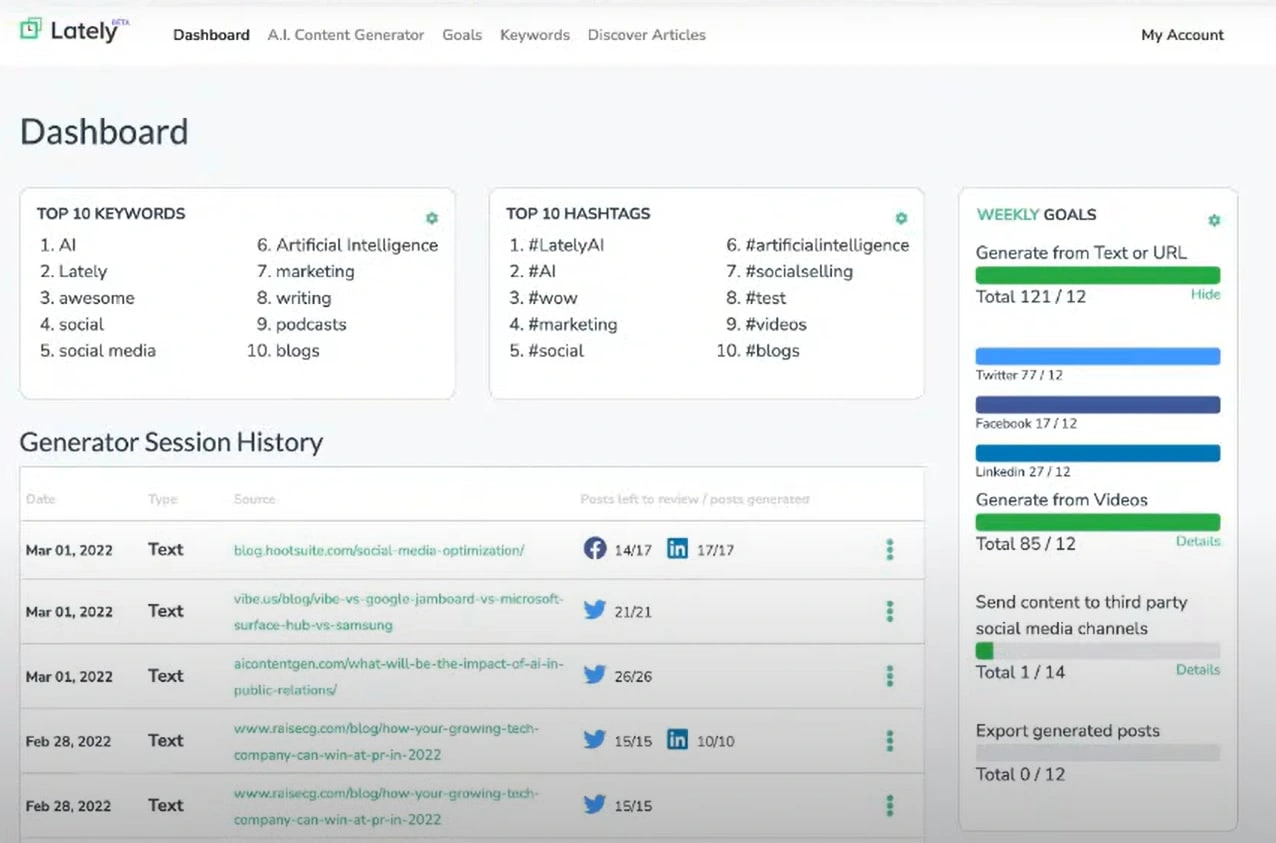
Lately’s dashboard shows you key metrics based on which it'll create the content | Source: Hootsuite
Summarize customer/market research using ChatGPT
While publicly available ML tools like ChatGPT might not be the best to create a strategy, however, it can give you an excellent starting point.
For instance, to conduct in-depth customer research, write a specific prompt (or hire an AI prompt engineer for one!). Based on the input, it'll provide a list of your ideal customer's pain points, goals, fears, and aspirations.
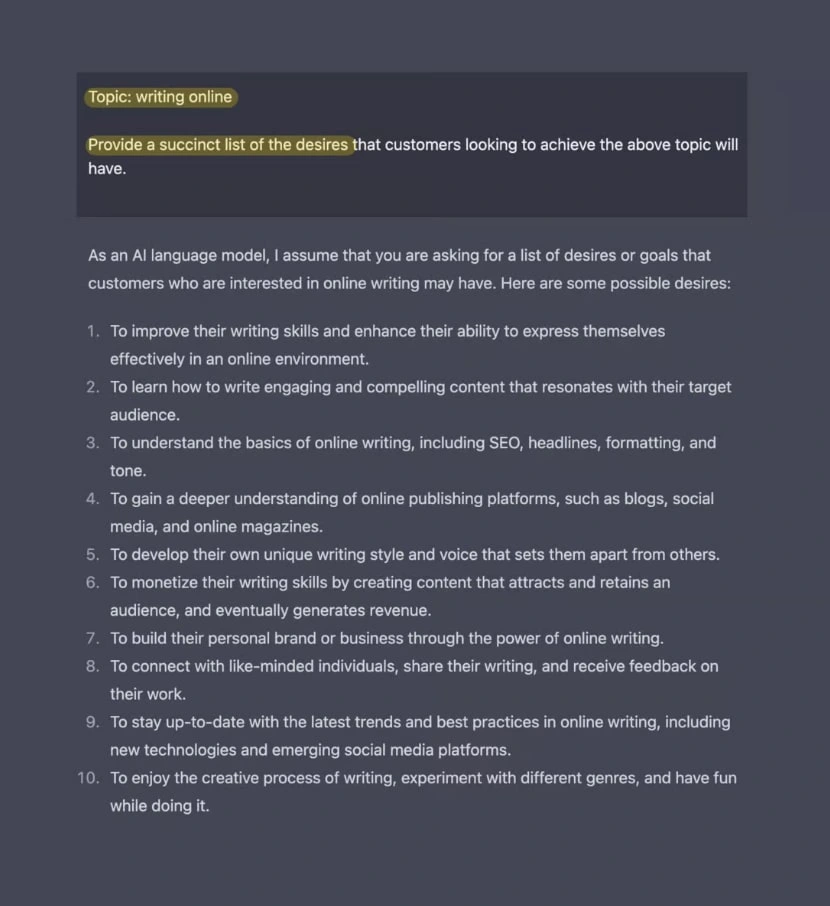
An example of ChatGPT’s response to a customer research prompt | Source: Neat Prompts
Supply chain optimization and warehouse management
You can use predictive analytics software that integrates with your warehouse systems and monitors them 24x7. These tools can gather data like performance metrics in real-time and alert you before they create any bottlenecks in your supply chain.
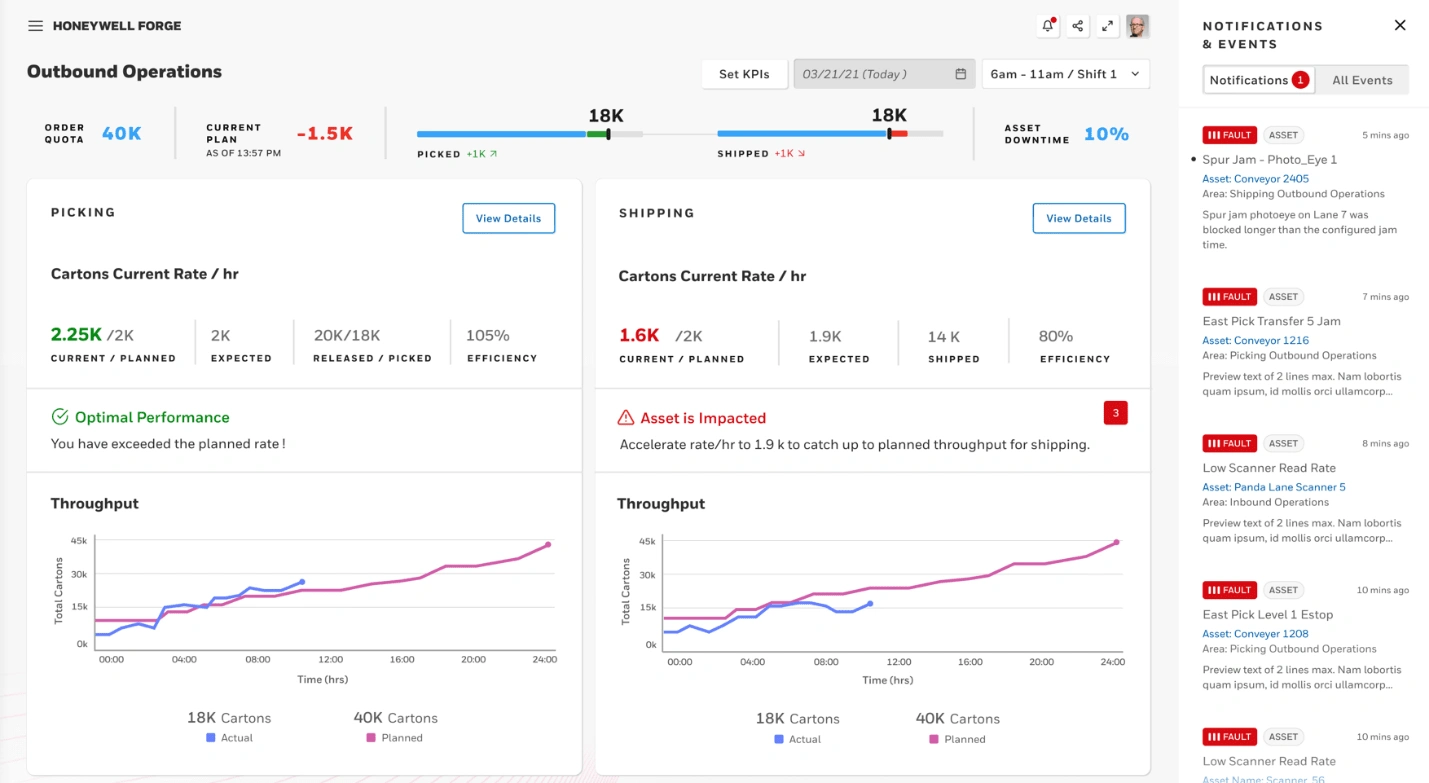
Honeywell's predictive maintenance dashboard shows you which systems are performing well and which are not | Source: VentureBeat
Chatbots for customer service through multiple channels
Use chatbots on channels like your website and social media to ensure customers can always contact you.
There are two types of bots: rule-based and AI-powered. While the former is helpful for canned responses like delivery time, the latter is for more complex queries like "What kind of materials is the product made of?"
An example of DoorLoop’s website chatbot that provides customers with three options: send a custom message, watch an on-demand demo, and search for help on their own.
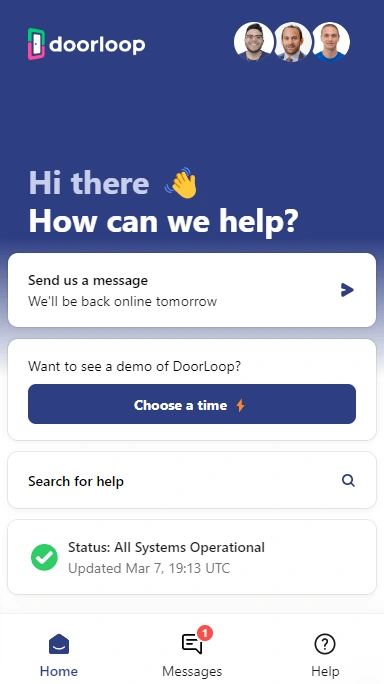
Source: DoorLoop
Deepfake technology for advertising campaigns
Lenovo launched an advertising product for small business owners that helps them use Queen Latifah as their brand's face.
The model was trained based on pre-recorded images and videos of hers. It generates a custom video ad for your brand based on the user's input. It's based on Deepfake technology, and the company plans on bringing in more celebrities for this campaign.

Lenovo Evolve Small homepage
Lead scoring software for sales teams
Small businesses waste too much time qualifying leads manually because of the nature of the business. For instance, if you're a consultant, it's common to go on 15 to 30-minute calls to discuss the prospect's needs and decide whether it's worth pursuing. But with lead scoring software, you can remove that bottleneck.
Instead of wasting time on calls, provide simple signals to the tool and ask them to fill out a form based on your preferences. The software will mark the leads based on your input and let you know if it’s the right fit.
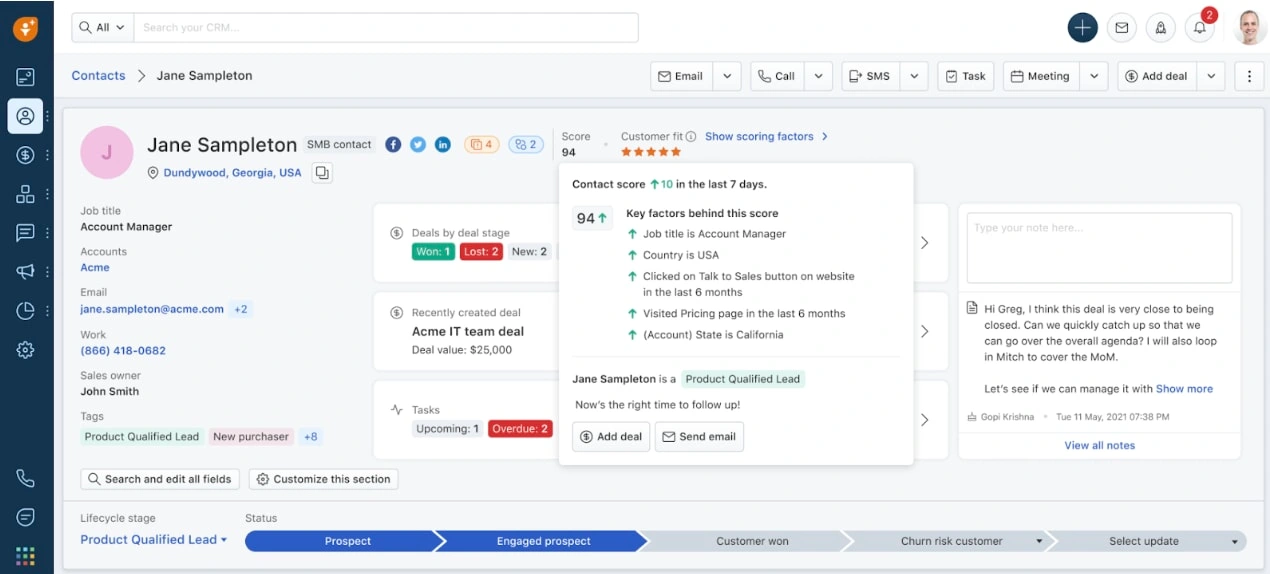
Freshsale’s dashboard helps you score leads based on your input | Source: G2
Hire your next machine learning expert with Fiverr
In short, if you're a small business owner, you cannot afford to ignore the benefits of machine learning. Even though it takes some time to get up and running, it can remarkably impact your bottom line.
Finding the right machine learning expert for your business is a challenge. This is Fiverr can help you hire freelancers to overcome that. We host an entire marketplace filled with experienced engineers that go into the depths of your business to build you the best model possible. Plus, we remove the hassle of managing them as you can easily hire multiple individuals and manage them in the same dashboard.
Ready to unleash the power of machine learning for your small business? Sign up for Fiverr today and hire your next AI engineer.









